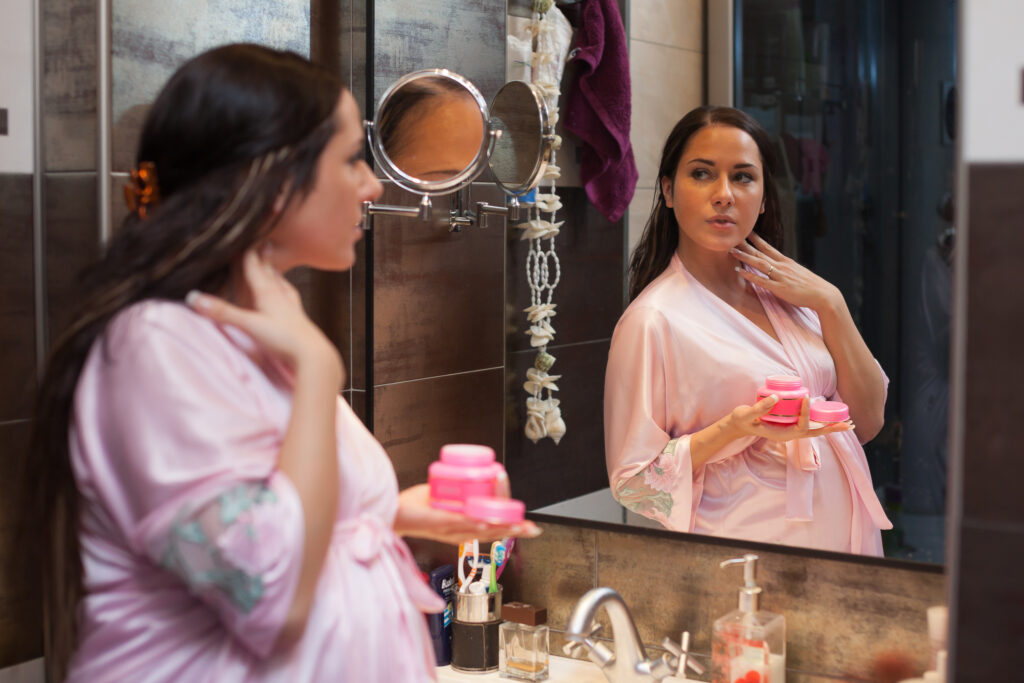Taking care of yourself while you’re pregnant should be a priority. Your body starts to change and so will some aspects of your lifestyle. You may find yourself changing your eating habits and even your skincare routine.
While some may not give it much thought, it is worth giving your skincare line-up a sift through. Most skincare products are completely safe for pregnancy. However, some skincare ingredients are best to be avoided when you’re expecting a baby.
Why Should I Avoid Certain Skincare Ingredients When I’m Pregnant?
Not all skincare is suitable for pregnancy. Some skincare ingredients can be absorbed into the bloodstream and end up being harmful to the developing baby.
A few ingredients are proven harmful or have suspected risks when used during pregnancy. Some ingredients may also have links to possible risks or have anecdotal evidence of being unsafe for the baby.
It’s worth noting that not a lot of clinical trials conducted for skincare ingredients have included pregnant women. This is why most skincare brands would label their packaging with lines like “The safety and efficacy of this product in pregnancy and lactation has not been established.”. Until further studies have proven they are safe to use during pregnancy, it may be best to avoid certain ingredients.
Skincare Ingredients to Avoid While Pregnant
Vitamin A or Retinoids
Oral and topical retinoids like isotretinoin, tretinoin, adapalene, and tazarotene should be avoided during pregnancy. The prescription and over-the-counter ingredients are often used to tackle acne and anti-aging.
High doses of vitamin A can be harmful to the baby. Oral retinoids like isotretinoin, brand name Accutane, can even lead to birth defects.
If you are on any prescription retinoids or anti-acne treatment, it is best to immediately stop taking these medications and consult your doctor about how to best move forward.
Hydroquinone
There aren’t many studies regarding hydroquinone use during pregnancy. However, considering how hydroquinone is absorbed through the skin at very high rates, many experts caution against using it when they are pregnant.
Hydroquinone is often prescribed to address dark spots or hyperpigmentation. It is best to consult with your doctor when discontinuing your use of hydroquinone.
High Doses of Beta Hydroxy Acids
Beta hydroxy acid (BHA) is the most popular ingredient used for chemical exfoliators and other skincare products that target acne, hyperpigmentation, texture, and aging.
The most common BHA is salicylic acid. In high doses in its oral form, like as an ingredient in aspirin, it can lead to various pregnancy complications and birth defects. Other forms of BHAs haven’t been studied to be safe for pregnancy.
Don’t go throwing away all your AHA and BHA products though. Small amounts applied to the skin in low doses are considered safe.
On the other hand, strong face and body peels containing salicylic acid should be avoided. If you must have a peel treatment done, make sure it is performed by a board-certified dermatologist. That way, they can do it safely considering your pregnancy.
Spironolactone
Spironolactone, brand name Aldactone, is used to treat adult acne by affecting hormones. The American Academy of Dermatology (AAD) warns those who are pregnant to immediately stop taking the medication as it can cause serious birth defects.
Not a lot of studies have been done to prove the safety of topical spironolactone and so experts advise avoiding it during pregnancy as well.
Clinical Treatments and Procedures
A lot of aesthetic treatments like botox, fillers, and other injectables should be avoided when pregnant.
Some facial treatments that do not have any strong chemical peels are generally okay, but it is always best to talk to your aesthetician or doctor to make sure you and your baby are safe.
Pregnancy-Safe Skincare Ingredients
Your skin changes during your pregnancy. Hormonal acne, melasma, hyperpigmentation, really oily skin, really dry skin, your skin can go through a lot.
While a lot of the prescription-strength skincare ingredients are off-limits until you and your baby are given the green light, that does not mean you have to sacrifice an effective skincare routine.
These skincare ingredients are safe to use during pregnancy and give you great results too. So you can optimize that pregnancy glow.
Peptides
Peptides are great at rebuilding and repairing damaged skin cells. It can help with your skin’s elasticity and overall appearance.
You can often find great quality peptide serums and moisturizers that help reduce the appearance of fine lines and give the skin a nice glow.
Vitamin C
Vitamin C is a great antioxidant that can treat fine lines and hyperpigmentation. If you can tolerate it, go for products with concentrations higher than 10% in the active form of l-ascorbic acid.
Hyaluronic Acid
Hyaluronic acid is a great way to bring more hydration to the skin. It can give the appearance of plumper and juicier-looking skin.
Bliss skincare products have a hydrating serum that keeps moisture in the skin, locking in that hydrated and glowy look to your skin.
Azelaic Acid
A great alternative to stronger AHAs and BHAs, azelaic acid is gentle yet effective. It evens out your skin tone and texture. It can also reduce blemishes and is a good antioxidant.
Sunscreen
Pregnant or not, you should already be using sunscreen daily. Unprotected sun exposure can increase your risk of developing melasma, which can be caused by pregnancy hormones. Reapplying your sunscreen every two hours is a must as well.
Sunscreen safe for pregnancy is often mineral-based. This means it can be a bit thicker and may have a white cast. A lot of brands have come out with better formulations over the years. This makes them easier to apply and reapply, as well as leaves little to no white-cast. It’s a matter of finding one that works for you.
Do you have any questions about pregnancy or need support? Maternal Resources is here to help you.


